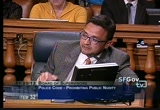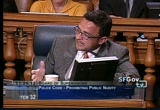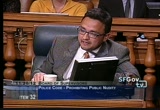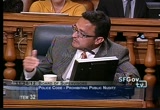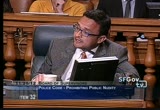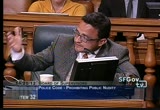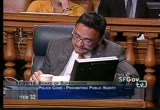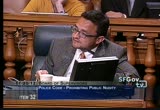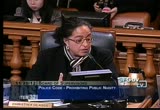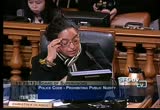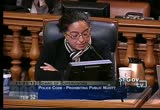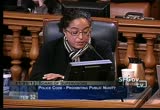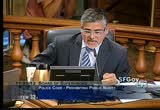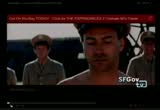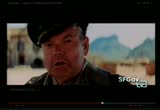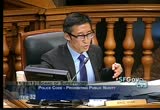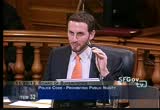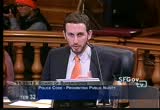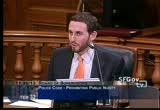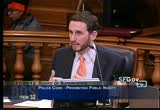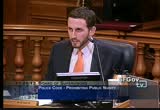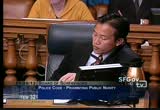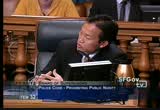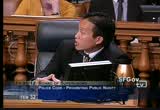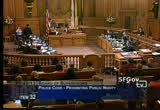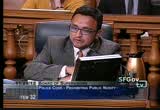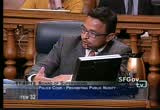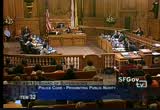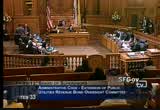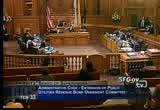tv [untitled] December 1, 2012 5:30am-6:00am PST
5:30 am
entirety of the city, which is what's happening here. you have one neighborhood that -- where this issue has come up, and now you have legislation that it passed, would it impact the entire city. and let me say that i certainly don't take the concerns that have been identified by supervisor wiener lightly. i understand that there are many people who reside in the castro, who reside in district 8, that have, you know, a very serious concerns about what's happening. and the question is not the issue of how serious this is, but simply what the best approach to addressing the situation is. and that's what it has come down to for me. and let me say that the main concern that i have, with respect to this legislation, is an issue of priorities.
5:31 am
as a city, in terms of we, as a body, on the board of supervisors, thinking about the legislative actions that are needed and the things that we need to prioritize as a legislative body, for me, i question whether or not this rises to the level that it should be a priority. not that it's not an important issue, but let's just take the example that this legislation passes and there is a nudity ban in the city and county of san francisco. and let's just say that once the ban is in place, you have a number of individuals who defy the ban, andjru÷et( ÷ actuallyo be nude in public. at some point, law enforcement will be called in to enforce the law that was just passed, and at jp$éó point, resources will be expended by our law enforcement agencies to enforce thatwjp law. i represent district 9.
5:32 am
district 9 includes the neighborhood of the mission, which actually shares a police station with district 8, with the castro. mission station, mission police station, serves both the castro and the mission. and i]b@%ñ can tell you that evy time that an incident happens in district 9, and unfortunately recently we have been talking about violent incidents and i call the captain and ask for more foot patrols and i ask for increasing the timeliness of the response, i ask for different strategies to deal with violent crime, the response repeatedly is i don't have the resources, i don't have the resources to do all the things that need to be done, i don't -- i think the captain is doing as much as anyone can possibly do, given the limited resources we have. but we do live in a time of limited resources. and when it comes to what is the best and most effective way of
5:33 am
using those limited resources, not that enforcing nudity laws is not important, but on the scale of how important it is relative to violent crime, i think that the focus should be violent crime. and i do fear that, if this law is passed, that the limited resources that, in this case the mission station has, are better spent focusing on preventing violent crime in other parts of the district. happening in the castro, not to minimize the seriousness of what's going on, but we do have government. we have to make choices in terms of what our priorities are. and until we get to a point that we have the level of staffing of our police department, where in fact we have the bodies to do everything that>q= needs to be e around community policing, i don't believe we're at the point where we can say that this becomes a priority over the violent crime that is happening in some parts of this city.
5:34 am
that is a very real concern that i have. and, you know, supervisor wiener said that we don't-á( want to pt our police officers in a terrible position. i do think that putting police officers in a situation where they have to choose where resources are deployed is a terrible position. and i would rather not make that the priority for this city. do have limited resources, and i think that in terms of priorities going forward, i think that violent crime, when it comes to the deployment of law enforcement should be the priority,.
5:35 am
parties, that are implicated here, together. you know, we have a history of these kinds of issues being mediated. there are agencies like the human rights commission that have played a role in other kinds of disputes. and i'm wondering whether or not there has been an effort to actually bring the different parties to the table. the folks that have legitimate concerns about what's happening in the castro, you mentioned the parents, you mentioned the single people who have issues with this as well, making sure that their voices are represented, and that we have a discussion with them, and some of the people that are advocating against this ban. what kind of efforts have we actually taken to make sure that we in fact have done everything we can, short of taking the steps of actually having a citywide ban. again, i think that there may be instances when something like this is appropriate. but i don't know if we have reached that point yet. so i'd like to know more about
5:36 am
what's happening -- what's happened with respect to efforts to mediate this dispute. and if it is the case that in fact all efforts to mediate have been exhausted, and that we have in fact explored the different options that are out there, then maybe we can have a conversation. fact has taken place. the last thing that i would say -- and i know that much debate will be had here, and my colleagues have other things to add, is i do worry, whenever as a lawyer, whenever you have ac4 ban of specific conduct and then you proceed to have exceptions to that ban. in this case, we have a nudity ban, but we have some exceptions as to when nudity might be acceptable. and i do have%("az a concern abt how it is that we came up with those exceptions. if there is going to be a ban on nudity, how is it that we decided that nudity in some instances is okay, how is it
5:37 am
that we decide that nudity in an event, parade, might be appropriate, but not on a day at a specific neighborhood. issues around free expression, you want to make sure that you're careful about how you craft those exceptions. so i'd like to hear more about that. but the i look forward toql%( discussion, and more than anything else, i think that this is one of those issues where hope that it is an opportunity for us, as a city, to have respectful dialogue on what is an issue where clearly there are different opinions. >> president chiu: supervisor olague. >> supervisor olague: in many ways i think that this is a solution looking for a problem. because with the exception of a small area in the castro, i'm not certain that this has reached such epidemic proportion
5:38 am
that it nes estates a citywide7e ban on nudity. the whole idea of this being a form of expression, not unlike -- that is sort of being limited, and in some ways is -- i don't know, is an imposition on a person's freedom of expression or civil liberties, i think that that's another conversation that i'm interested in having at some point. but it clearly isn't going to happen today. so -- but i do believe that when we start to surrender some of these basic rights, citywide, that, you know, what's next. you know, a lot of people think that that's cliché butkk%( 1añ k tattooing or yellow hair, or what. so i just -- i think it's unfortunate. too, i agree with most of the --
5:39 am
i think everything that supervisor campos said, and that is especially it's unfortunate that some agency, whether it's the human rights commission, or some civic leaders, couldn't just bring people together to discuss how to mitigate this issue, and the way it's castro. it's a very different scene from when i moved to the castro in 1982. so this whole again idea of expression and civil liberties and these sorts of issues i think can't be understated at all. and then finally, i think that supervisor campos again mentioned -- i mean just unfortunate that issues like nudity takes such a big level -- it takes a great deal of attention when you have all these issues around gang violence, that are happening, bullying, achievement gaps in high schools, cost of housing, unemployment, you have all these
5:40 am
other issues that are so critical to how the quality of life and, you know, people's ability to stay in san francisco or not. and, you know, so much focus is given to this issue of nudity. so i mean i guess here we are. the media loves issues like nudity. while, you know, people are, you know, dying in the streets. i don't know. again, when it comes to priorities, it just seems a little bit on the absurd side to me. raised for people who, you know, feel uncomfortable with this, you know, in their neighborhood. but i just haven't seen it really outside of this area, as being an issue, necessarily. and certainly mental health is frequently ignored and last time i saw somebody take their clothes off it was due to that
5:41 am
and they strip down and sit in front of a muni bus and lay in front of it. that's a public health issue that's sort of outside this conversation but i'm just saying that, you know, outside of the street fairs and this isolated area, i'm not convinced that this is something that is necessarily being abused in a way that wouldrjjíñ meritñnúñ g more public resources into this area. that's all. so i can't support it. i just don't support it. >> president chiu: supervisor avalos. >> supervisor avalos: thank you, president chiu. i can appreciate supervisor wiener's wanting to bring this forward as an issue. i think that he's received a lot of commentary about it over the years. and it seems like it's one issue that yu yud want to act on.
5:42 am
i felt if this is an,( tfç issuu act on that it can backfire in lots of different ways. i am concerned about civil rights, i'm concerned about free speech, i'm concerned about just changing san francisco's style and how we are as a city. and it's something that's very troubling to me to see that. we're a city that actually had -- the publication of city life that naked lunch came out there was a ban about that. the city looks at free speech and expression, we're a beacon of light to other places around the country and sometimes there's weirdness about how we express ourselves but i think that is what is great about san francisco. i have something teed up that i was saving for before, for chris daly when he used the f word in the board chambers but i think this is more appropriate.
5:43 am
catch-22. and think it expresses some of the absurdity of this that we have in the backdrop of world war ii where people are killing each other, the inconsequential nudity that is before the general is sh something that is quite meaningless over all. >> why aren't you wearing clothes, captain? >> don't wanna. >> what do you mean you don't want to. why don't you want to? >> i don't know. i just don't wanna. >> why isn't he wearing clothes? >> he's talking to you. >> why isn't he wearing clothes, major? why isn't he wearing clothes, sergeant. >> the man was killed in his plane and bled all over him. his closes haven't come back from the -- where is his
5:44 am
underwear. >> in the laundry, sir. >> that sounds like a lot of crap to me. >> it is a lot of crap, sir. >> sir, you have my word for it this man will be punished severely. >> what the hell do i care. if he wants to receive a medal without any clothes on, what the hell business is it of yours. >> my sentiments exactly, sir. >> here's your medal, captain. you're a very weird person. >> president chiu: if i could remind members of the public that in the board chamber we do not express either support or us to move the proceedings along. supervisor avalos. >> supervisor avalos: so i cannot and will not bite this i just can't do it. i vote no. >> president chiu: supervisor mar. >> supervisor mar: thank you.
5:45 am
i do understand supervisor wiener's efforts toágu address e concerns from residents and businesses in his district. i look at this issue as a parent. i do have some concerns of nudity around schools and around young children. but i really do appreciate the comments made by many in the audience of san francisco's uniqueness and our diverse culture but especially our respect for personal freedoms. i also have concerns similar to supervisor campos' that this may be an issue that's about one neighborhood, and mostly about one plaza, and i really don't think we need citywide legislation, especially overbroad legislation to deal with an isolated what i would call an isolated community incident. and i think this legislation also, as supervisor olague said, is not good use of our time and i will be voting no on it as well. >> president chiu: is there further discussion? supervisor wiener.
5:46 am
>> supervisor wiener: thank you. thank you arbitration colleagues, for your comments. i just want to make a few points. first of all -- and some of the points i've heard today are some that some of the opposite have raised as well. to suggest this is not important enough or worthy of our time i did a little research and we could go back and i could probably find some resolutions and ordinances from pretty much every member of this body, that would -- that may fall into that category, that are not the most but that actually matter in a lot of people's lives. and so if the new rule is that this board can only take up matters that are somehow monumental, while i really would be interested in that
5:47 am
discussion, our agendas would be much lighter, and but that would be a new way of doing business at the board of supervisors. and it would be different than probably the way we've operated where, as a board of supervisors, we're not the united states be senate. we are a local government entity, and we deal with the day-to-day challenges of a city, and of neighborhoods. and some of those are monumental and some of thosegqjatç are very mundane. and as a district supervisor, you can only imagine if i, or any of us were saying i'm having trouble getting this pothole filled in front of my house, can you please help me. and if you responded and said well let's see, if i have to fix muni and get all the help for all the mentally ill people in our city and close the achievement gap and help all the small businesses that are struggling in this city, do all
5:48 am
of those things, and then when i'm done, i'll get to your pothole to be filled. i have a feeling your constituent probably wouldn't respond very positively to that. the fact is that we deal with a whole gamut of issues at this board,>(( úñ large to small, and the large are not to the exclusion of the small. the fact is that this is a real issue. and i think, colleagues, you'll know that you can love or hate the legislation i proposed, but i work on a lot of different issues, large and small,k$%($$ao all of you. i want to respond to supervisor campos' suggestions this is somehow going to undermine the enforcement against gangs. i don't agree with that at all. the fact is that our police deal with a lot of crimes that are not violent crimes, whether it's auto thefts or trespassing or all sorts of different -- or shoplifting, all sorts of different crimes that are not violent.
5:49 am
if we're going to say the police cannot or should not enforce those laws because we have violence going on, i don't think that most people would agree with that. of course violence always needs to be top priority and i can tell supervisor campos how many times, in the castro, or in noe valley, we hear from mission station, listen, we have to deal with the violence in the mission, and that's top priority. and my constituents understand that, and they respect that, and i've never heard any of them push back against that. everyone knows dealing with violent crime is a top priority but that doesn't mean you can't deal with something because you want police to deal with violent crime. before the introduction of this legislation, like i said this is legislation, like i said this is going on'l people who the minute it started and we weighe waited two years. we tried to resolve this. it was not going to be resolved
5:50 am
or moved forward. finally i want to address the issue of free expression. and we are a city of free expression, and it's very important to me and i know to all of us. i don't agree that having yellow your peenis at a busy street corner as people go by. i don't agree with that comparison. free expression in the abstract is really nice until, if you call this free expression, until it comes to yourumnngvz neighbo. and i wonder what would happen if the naked guys started hanging out in the richmond or 24th and folsom or down near balboa park. response would be. and i guarantee you people would not have waited as long as we waited in the castro to do something about it.
5:51 am
so, colleagues, i understand and respect all of your comments. truly arguments against this legislation on the merits. and, colleagues, i ask for your support. >> supervisor campos: president chiu. >> president chiu: thank you. first of all, i want to thank all the folks in this room who have engaged in this conversation in recent months. and i do want to state that i appreciate the arguments raised by the-#( gí opponents. i had opportunity to sit down with some of the leaders to this that reasonable folks can choose to disagree on this issue. i will say that i don't see necessarily a middle ground on this issue, just given what i have heard from those conversations. and i think we have a situation
5:52 am
here, colleagues, where we have a colleague who represents a neighborhood and a district that has a situation, and he has attempted to move forward a more modest set of measures to address the situation, but we are where we are today. say, colleagues that many of us are probably quietly relieved that this is not a situation that we've had to deal with in our own neighborhood. now as someone who has wondered if there were ways to limit this, let me say a couple of things to that. i think the suggestion in a the exceptions in this measure somehow are not a positive part of this legislation, i think that's not necessarily a position i would support. exceptions for certain types of events, where i think we all do think that it might be appropriate for public nudity to occur. that being said, i know there are also some suggestions about whether this legislation ought
5:53 am
to be narrowly defined around a district, where we all know what would likely happen if that were the case. and i will tell you that i did hear from many of my constituents that knew that this is a situation in the castro, but did ask me to support this legislation because they do not particularly appropriate in our tors neighborhoods, in fisherman's wharf, in the heart of my district, in chinatown, in -- neighborhood and family oriented districts, in nob hill so for those reasons i will be supporting this legislation. i think that the discussion has been a very good one. and i do not think that this7y%ç legislation will somehow end the spirit that we all love about our city and what is special about our city. but i do think that this is an appropriate measure. and to address the suggestion
5:54 am
that somehow this is a more trivial concern i agree with supervisor wiener, we consider thousands of measures every year and some of them deal with very profound circumstances facing our city. others deal with the potholes. and what's happening on the street corner, and what we're hearing from our parents. us to address those issues large and small and again that is why i will be supporting this measure. >> supervisor campos: thank you. supervisor olague. >> supervisor olague: i'm just going to mention that i receive e-mails all the time with people that are upset that there are homeless people in the neighborhood. i probably get more e-mails protesting that than just about anything and i would be the last person to ever legislate banning homeless people from certain parts of the city. so
5:55 am
5:56 am
case. and the second point is i want to be very clear. i don't know that anyone is saying taking care of the little things that happen in a neighborhood are not important. those things are what make the life of a neighborhood work. the pothole is as important as any piece of legislation because it is critical to the daily life of that individual. but what we are saying is that if i have a pothole in my neighborhood, i am not going to come to the board of supervisors, and pass citywide legislation to address it. the question is whether or not this legislation, this citywide ban, is the best way to deal with this serious situation. some of us question whether or not it is. and so that's the difference. but to say that somehow that means that we don't care about the nuts and bolts of what happens in a neighborhood, that is not the case. it's simply how you address it. >> president chiu: colleagues, any further discussion?
5:57 am
madam clerk, please call the roll. >> clerk calvillo: on item 32 as amended, supervisor avalos, no. supervisor campos, no. president chiu, aye. supervisor chu, aye. supervisor cohen, aye. supervisor elsbernd, aye. supervisor farrell, aye. supervisor kim, no. supervisor mar, no. supervisor olague, no. supervisor wiener, aye. there are six ayes and five nos. >> president chiu: this ordinance is passed on the first reading. afternoon. welcome back to the
5:58 am
san francisco board of supervisors meeting of tuesday, november 20, 2012. can we have order in the chambers please. thank you. madam clerk, let's go to item 33. >> clerk calvillo: item 33, an ordinance amending the administrative code to extend the sunset date of the public utilities revenue bond oversight supervisor farrell. >> supervisor farrell: thank you. colleagues, this is an ordinance extending the puc aback to 2016. and i wanted to -- i have circulated previously an amendment to this, a non-substantive amendment ensuring that there is no gap in coverage of the rback between january and the new effective date of this legislation. so i ask that we adopt the amendment and would ask for your support in adopting this ordinance. thank you. >> president chiu: supervisor farrell made a motion to that,
5:59 am
seconded by supervisor chu. any objection? without objection the amendment passes. on the underlying ordinances as amended, roll call. >> clerk calvillo: on item 33 as amended, supervisor avalos, aye. supervisor campos, aye. president chiu, aye. supervisor chu. aye, supervisor cohen, aye. supervisor elsbernd, aye. supervisor farrell, aye. supervisor kim, aye. supervisor mar, aye. supervisor olague, aye. supervisor wiener, aye. there are 11 ayes. >> president chiu: the ordinance is passed on first read. colleagues why don't we take up our 4 pm special order which should take one minute. should take one minute. would you callv3 hearing of persons interested in the department of public works pated august 9, 2012 approving a
61 Views
IN COLLECTIONS
SFGTV: San Francisco Government Television Television Archive
Television Archive  Television Archive News Search Service
Television Archive News Search Service 
Uploaded by TV Archive on

 Live Music Archive
Live Music Archive Librivox Free Audio
Librivox Free Audio Metropolitan Museum
Metropolitan Museum Cleveland Museum of Art
Cleveland Museum of Art Internet Arcade
Internet Arcade Console Living Room
Console Living Room Books to Borrow
Books to Borrow Open Library
Open Library TV News
TV News Understanding 9/11
Understanding 9/11